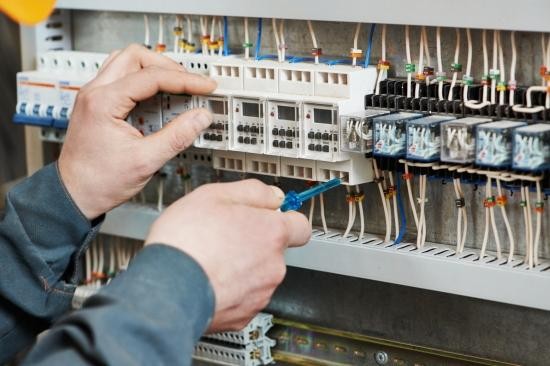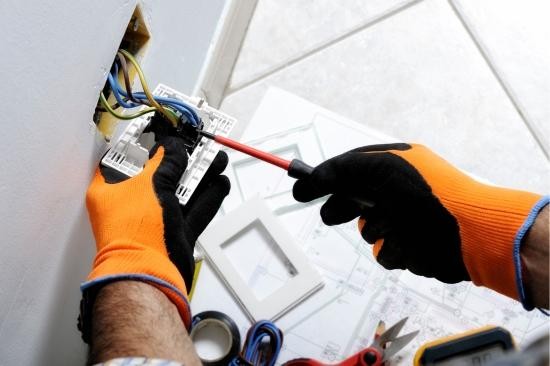Price Breakdown for a Full Home Rewiring
Rewiring your home might not be the most glamorous home improvement project, but it’s one of the most essential. Outdated or faulty wiring can pose serious safety risks, from electrical fires to shocks, particularly in older UK homes. A full rewire ensures your electrical system meets modern safety standards, handles the demands of modern appliances, and future-proofs your property for years to come.
But how much does a full home rewire cost? The answer depends on several factors, including the size of your property, the condition of your current wiring, and the number of fixtures or outlets you need. While rewiring is a significant investment, it’s also one that enhances safety, improves energy efficiency, and can increase your home’s value.
In this guide, we’ll break down the average costs of rewiring a home in 2024, the factors that influence these costs, and tips to help you save money. If you’re dealing with frequent electrical issues, such as tripped circuits or flickering lights, it may be time to explore a full rewire. For more on diagnosing electrical problems, check out our blog on Common Electrical Faults in Older UK Homes and How to Address Them.
Let’s dive in and uncover what’s involved in a full home rewire and how to budget for it effectively.
What Is Involved in a Full Home Rewire?
A full home rewire goes far beyond just replacing a few old wires—it’s a comprehensive update of your entire electrical system to ensure it’s safe, efficient, and suitable for modern living. This process involves removing outdated or damaged wiring and replacing it with new cabling, fixtures, and systems that meet current UK safety standards. Let’s break down what’s typically involved in a full rewire:
1. Replacing Electrical Wiring
The core of any rewire is replacing the existing electrical cables hidden within your walls, ceilings, and floors. Old wiring—especially in homes built before the 1970s—may use outdated materials like rubber or cloth insulation, which are no longer safe. Modern cables are insulated with PVC, ensuring greater durability and fire resistance.
During the process:
- Old cables are removed, and new wiring is installed to power lighting, sockets, and appliances.
- Wiring is routed through walls, under floors, or in loft spaces to keep it hidden and neat.
This stage requires precision and expertise, as electricians need to minimise disruption to your home’s structure while ensuring safe installations.
2. Upgrading the Consumer Unit
Also known as the fuse box, the consumer unit is the central hub of your home’s electrical system. As part of a full rewire, outdated units are replaced with modern consumer units equipped with:
- RCDs (Residual Current Devices): These safety devices cut power in the event of a fault to prevent electric shocks.
- MCBs (Miniature Circuit Breakers): These automatically switch off circuits if they detect overloads or faults.
- Surge Protection: Protects your appliances from electrical surges caused by power fluctuations.
A modern consumer unit ensures your electrical system complies with current UK regulations and provides maximum safety for your household.
3. Installing New Sockets, Switches, and Fixtures
Rewiring is the perfect opportunity to modernise your home by installing additional sockets, light switches, and fixtures to suit your needs. In older homes, there are often too few sockets to accommodate today’s technology-heavy lifestyles. A full rewire typically includes:
- Replacing old single sockets with double sockets to accommodate multiple devices.
- Upgrading switches to modern designs, such as dimmer switches or smart controls.
- Installing modern lighting fixtures, including energy-efficient LED lights or downlights.
You can also future-proof your home by installing USB sockets, smart home features, or even wiring for underfloor heating and other advanced systems.
4. Testing and Certification
Once the rewiring work is complete, a qualified electrician will carry out extensive testing to ensure everything is safe and functioning correctly. This includes checking:
- Voltage and load capabilities.
- RCD performance to ensure safety during faults.
- Compliance with UK building and electrical regulations.
After testing, you’ll receive an Electrical Installation Certificate (EIC), which confirms that your home’s new wiring meets current standards. This certificate is essential for insurance purposes and when selling your property.
5. Making Good (Repairing Walls and Ceilings)
During a full rewire, electricians may need to cut into walls, ceilings, or floors to access and replace wiring. While this is unavoidable, it can leave behind some mess. Depending on your agreement with your electrician, “making good” involves repairing these areas to prepare them for redecorating:
- Filling and plastering holes in walls or ceilings.
- Repairing floorboards or skirting boards where needed.
Some electricians include basic repairs in their quotes, but larger patchwork or redecorating may require hiring a plasterer or decorator separately.
How Long Does a Full Rewire Take?
The length of a rewiring project depends on the size of your property and the complexity of the work. On average:
- Small Homes or Flats (1–2 bedrooms): 3–5 days.
- Medium Homes (3 bedrooms): 5–7 days.
- Larger Homes (4+ bedrooms): 7–10 days or longer.
Rewiring is disruptive, as electricians will need to lift carpets, floorboards, and cut into walls, so many homeowners choose to complete it while they’re renovating or between moves.
By understanding what’s involved in a full home rewire, you can appreciate the work’s scope and ensure it’s carried out safely and efficiently.
Key Factors That Affect the Cost of a Rewire
When budgeting for a full home rewire, it’s essential to understand what drives the overall cost. Rewiring isn’t a “one-size-fits-all” job—several factors will influence the price, from the size of your property to the condition of your existing system. Here’s a breakdown of the main cost factors to help you plan effectively:
1. Property Size
Unsurprisingly, the size of your home has a significant impact on the cost of a rewire. Larger properties require more wiring, sockets, and labour, which increases the overall price:
- Flats or Small Homes (1–2 bedrooms): £1,500–£3,000.
- Medium Homes (3 bedrooms): £3,000–£5,000.
- Larger Homes (4+ bedrooms): £5,000–£7,500 or more, depending on the layout and complexity.
If your property has multiple floors or an extensive loft space, additional wiring and access challenges can further increase costs.
2. Condition of Existing Wiring
The state of your current electrical system will also influence the price of a rewire. Older homes with outdated or unsafe wiring (such as old rubber or cloth insulation) can take longer to rewire and may require extra work:
- Damaged or Dangerous Wiring: Removing hazardous wiring can add to labour costs.
- Access Challenges: In older properties, walls and floors may require more extensive cutting to access hidden wiring.
- Updating Consumer Units: Replacing outdated fuse boxes with modern consumer units adds £300–£600 to the overall cost.
Rewiring a home that hasn’t been updated in decades often uncovers additional issues that need addressing, so it’s wise to budget for contingencies.
3. Number of Fixtures and Sockets
The more electrical fixtures, sockets, and switches you need, the higher the cost of materials and labour. Modern homes typically require more sockets and lighting points to accommodate today’s technology-driven lifestyles:
- Basic Rewire: Includes a standard number of sockets, light switches, and fixtures.
- Custom Features: Additional sockets, USB outlets, dimmer switches, or modern lighting can add £20–£50 per fixture.
If you’re adding advanced features like smart thermostats or smart lighting systems, this will also increase costs but can improve energy efficiency and convenience.
4. Labour Costs
Labour is one of the biggest components of a rewiring project, and rates can vary depending on your location and the complexity of the job. Here’s what to consider:
- Regional Variations: Labour costs are typically higher in London and the South East, where electricians may charge £250–£350 per day. In other parts of the UK, rates average around £150–£250 per day.
- Project Duration: A larger or more complex rewire can take 1–2 weeks, increasing labour costs.
To save money, it’s important to get multiple quotes from qualified electricians and confirm that they are registered with a professional body like NICEIC or NAPIT.
5. Access and Property Layout
The ease of accessing your wiring will also affect costs. Homes with tricky layouts or limited access (such as older houses or properties with solid walls) can increase labour time and effort:
- Properties with Plaster Walls: Cutting into walls and making good afterward adds time and cost.
- Lofts and Basements: Installing wiring in hard-to-reach areas increases complexity.
If you’re planning renovations alongside the rewire, coordinating these projects can minimise disruption and save on labour costs.
6. Additional Upgrades
Many homeowners use rewiring as an opportunity to modernise their homes with additional electrical upgrades. While these add value and functionality, they will increase the overall cost:
- Smart Home Features: Adding smart lighting, thermostats, or home automation systems can cost £200–£1,000 depending on complexity.
- Energy-Efficient Lighting: LED downlights or feature lighting cost £20–£50 per fitting.
- Security Systems: Installing modern security alarms, CCTV, or external lighting adds further expense.
While these upgrades come at an extra cost, they improve convenience, energy efficiency, and the long-term value of your home.
7. “Making Good” and Repairs
After rewiring work, your walls, ceilings, and floors may need some repair work (“making good”). Depending on the extent of the disruption, you may need to budget for:
- Plastering and patching holes: £300–£1,000 depending on the amount of work needed.
- Repainting or redecorating: £200–£1,500 depending on the number of rooms.
While some electricians include basic repairs in their quote, it’s always best to confirm beforehand to avoid unexpected costs.
By understanding these key factors, you can budget more effectively for your rewiring project and prioritise what’s most important for your home.

Average Costs for Full Home Rewiring in 2024
To help you plan your budget for a full home rewire, it’s useful to have a clear idea of the average costs involved. Prices can vary depending on the size of your home, the complexity of the work, and the level of upgrades you choose. Below, we’ve broken down the average costs for different property types, based on 2024 rates.
Flats and Small Homes (1–2 Bedrooms)
Smaller properties are generally the least expensive to rewire due to fewer sockets, lighting fixtures, and shorter wiring runs. Typical costs include:
- Labour and Materials: £1,500–£3,000.
- New Consumer Unit: £300–£600.
- Total Estimated Cost: £2,000–£3,500.
For flats or smaller homes, a rewiring project typically takes 3–5 days, depending on access and the number of fixtures being replaced.
Medium Homes (3-Bedroom Properties)
A typical 3-bedroom semi-detached home is one of the most common property types in the UK. Rewiring these properties involves more fixtures and wiring, so costs are slightly higher:
- Labour and Materials: £3,000–£4,500.
- New Consumer Unit: £400–£600.
- Total Estimated Cost: £3,500–£5,500.
The work for a medium-sized home usually takes around 5–7 days and may involve additional tasks like replacing floorboards or patching plaster.
Larger Homes (4+ Bedrooms)
For larger homes with four or more bedrooms, the rewiring process becomes more complex, with greater electrical demand and a larger number of rooms to cover. Costs include:
- Labour and Materials: £5,000–£7,000.
- New Consumer Unit: £500–£800.
- Total Estimated Cost: £6,000–£9,000 or more.
Rewiring a larger property can take 7–10 days or longer, especially if additional work like installing smart systems or extensive repairs is involved.
Breakdown of Costs by Property Size
Here’s a quick table to summarise the average costs for full home rewiring based on property size:
| Property Size | Labour & Materials | Consumer Unit | Total Estimated Cost |
|---|---|---|---|
| 1–2 Bedroom Flat/House | £1,500–£3,000 | £300–£600 | £2,000–£3,500 |
| 3-Bedroom Home | £3,000–£4,500 | £400–£600 | £3,500–£5,500 |
| 4+ Bedroom Home | £5,000–£7,000 | £500–£800 | £6,000–£9,000+ |
Additional Features That Can Increase Costs
While the costs above cover standard rewiring, adding additional features or upgrades can increase the total price. These include:
- Smart Home Systems: Installing smart lighting, thermostats, or home automation systems can add £500–£1,500.
- USB Sockets: Replacing traditional outlets with USB-integrated sockets costs £20–£50 per unit.
- External Wiring: Running cables to garden lighting, sheds, or outbuildings adds £300–£1,000, depending on distance.
Discuss these options with your electrician during the planning stage to ensure they’re included in your budget.
How to Get Accurate Quotes
To ensure you get the best value for your rewiring project, always request quotes from multiple electricians. When comparing quotes, make sure they include:
- A detailed breakdown of labour and material costs.
- Costs for replacing the consumer unit, if necessary.
- Any additional expenses, such as “making good” repairs or smart system installations.
Working with a qualified electrician registered with organisations like NICEIC or NAPIT ensures the job meets current UK safety standards.
Now that you have a clear understanding of average costs, let’s explore some hidden expenses that homeowners often overlook during a full home rewire.

Hidden Costs and Additional Expenses
When budgeting for a full home rewire, it’s easy to focus on the core costs like labour, wiring, and the consumer unit. However, there are several hidden expenses that can sneak up during the project. Being aware of these potential extras will help you prepare a more realistic budget and avoid unwanted surprises. Here’s a breakdown of additional costs to consider:
1. Plastering and Repairing Walls
Rewiring a home often requires cutting into walls, ceilings, or floors to access old wiring and install new cables. While electricians do their best to minimise damage, some patching and repairs are unavoidable:
- Plaster Repairs: Filling and patching holes typically costs between £300–£1,000, depending on the size of your property and the extent of the damage.
- Repainting: Once the plaster has been repaired, repainting rooms can add another £200–£1,500, depending on the number of rooms affected.
Some electricians include basic “making good” in their quotes, but full repairs and decorating are often left to the homeowner. It’s worth clarifying this upfront with your contractor.
2. Upgrading the Consumer Unit
Replacing your old fuse box with a modern consumer unit is usually included in the cost of a full rewire. However, if your existing unit doesn’t comply with current UK safety regulations, an upgrade is essential. The cost of a new consumer unit typically ranges from £300–£600, but more complex installations may increase this figure.
Modern consumer units come with added safety features, such as:
- RCDs (Residual Current Devices): Automatically cut power to prevent electric shocks.
- Surge Protection Devices: Protect appliances and electronics from power surges.
Upgrading your consumer unit ensures your home meets safety standards and gives you peace of mind for years to come.
3. Installing Additional Sockets and Fixtures
One of the benefits of rewiring is the opportunity to upgrade your home’s electrical system with modern features. However, adding extra sockets, light switches, or fixtures can increase the overall cost:
- Extra Sockets: Installing additional double sockets costs £20–£50 per unit, depending on location and labour.
- USB Sockets: USB-integrated outlets are becoming increasingly popular, costing around £30–£60 per unit.
- Feature Lighting: Upgrading to modern LED lighting or dimmer switches can add £50–£150 per room.
While these extras add to the cost, they can greatly improve the functionality and convenience of your home.
4. Smart Home Upgrades
Many homeowners choose to integrate smart home features during a full rewire. While these upgrades can enhance your home’s energy efficiency and convenience, they do come with additional costs:
- Smart Thermostats: Installing systems like Hive or Nest typically costs £200–£300 but can help save on energy bills.
- Smart Lighting: Wi-Fi-enabled lighting systems, controlled via smartphone or voice assistant, range from £50–£150 per fixture.
- Security Systems: Adding smart security features, such as alarms or CCTV, can cost £500–£1,500 depending on the complexity.
For more information on smart upgrades, check out our guide on How to Install a Smart Thermostat.
5. Waste Removal
Rewiring generates a surprising amount of waste, from old wiring and fittings to plaster debris. Waste removal isn’t always included in an electrician’s quote, so you may need to budget for:
- Skip Hire: £200–£400, depending on the size of the skip and location.
- Contractor Cleanup Fees: Some contractors charge an additional £50–£150 for waste disposal services.
Always clarify who is responsible for waste removal before work begins to avoid unexpected charges.
6. Unexpected Issues
As with any major home improvement project, unexpected problems can arise during a rewire, especially in older homes. These might include:
- Hidden Damage: Discovering damaged or unsafe wiring, which needs replacing urgently.
- Structural Issues: Problems with walls or floors may require additional repair work.
- Outdated Systems: If your home has very old electrics, additional updates might be required to bring everything up to modern standards.
To cover these unforeseen expenses, it’s a good idea to set aside a contingency fund of around 10%–15% of your overall budget.
7. Temporary Accommodation
A full rewire is a disruptive process that often involves turning off the power in your home for several days. If you’re unable to live in the property during this time, you may need to budget for temporary accommodation:
- Hotel or B&B Costs: £50–£150 per night, depending on your location and needs.
- Short-Term Rentals: If the project takes longer, renting a short-term property may be necessary.
Some homeowners choose to combine rewiring with other renovations to make the most of the time away from home.
Being Prepared Saves Money
By anticipating these hidden costs and discussing them upfront with your electrician, you can create a more accurate budget for your rewiring project. This preparation ensures you’re not caught off guard by unexpected expenses, making the entire process smoother and less stressful.

Cost-Saving Tips for a Full Home Rewire
A full home rewire is an essential investment, but that doesn’t mean you can’t find ways to keep costs under control. With careful planning, smart decision-making, and clear communication with your electrician, you can ensure you get the best value for your money. Here are practical tips to save on rewiring costs without cutting corners on safety or quality.
1. Combine Projects
If you’re already planning other renovations, such as plastering, redecorating, or replacing flooring, it makes sense to combine them with a full rewire. Why?
- Electricians often need to lift floorboards, cut into walls, and remove plaster during a rewire, so combining work reduces duplication of labour.
- You save money on repairs and redecorating since everything can be completed in one go.
For example, if you’re planning a loft conversion or an upgrade to your insulation, this is the perfect time to add new wiring. For eco-friendly upgrades, check out our guide on Eco-Friendly Insulation Options.
2. Get Multiple Quotes
One of the best ways to save money is to shop around. Always get at least three quotes from qualified and reputable electricians. When comparing quotes:
- Look for a detailed breakdown of labour, materials, and any “extras” like repairing walls or installing additional sockets.
- Ensure the electrician is registered with a professional body, such as NICEIC or NAPIT, to guarantee safety and compliance.
- Ask if any discounts are available for combining services or booking during quieter periods.
While it’s tempting to go for the cheapest quote, prioritise quality and experience to avoid costly mistakes or rework.
3. Prioritise Your Needs
Deciding what’s essential versus what’s optional can help you stay within budget. For instance:
- Essential Upgrades: Focus on safety and functionality first, such as new wiring, consumer units, and standard sockets.
- Optional Extras: Features like smart lighting, USB sockets, or dimmer switches can be added later if funds allow.
Work with your electrician to prioritise the most critical parts of the rewire while leaving room for future upgrades.
4. Plan Your Layout Carefully
Adding extra sockets, light switches, or fixtures increases both labour and material costs. Before work begins, plan your electrical layout carefully to avoid unnecessary changes:
- Think about where you need sockets most, like behind the TV, near the bed, or in home offices.
- Opt for double sockets instead of single ones to reduce the number of outlets you need.
- Avoid excessive fixtures unless they’re truly necessary—every socket and light fitting adds to your total cost.
Taking the time to plan ahead will help you avoid costly alterations midway through the project.
5. Stay in Your Home During the Work
A full rewire can be disruptive, and many homeowners consider moving out temporarily. However, staying in your home during the work (if possible) can save you hundreds on accommodation costs:
- Arrange the work in phases so you can still use parts of your home while electricians rewire other areas.
- Communicate with your electrician to schedule work at convenient times, reducing disruption to your routine.
Bear in mind that you may need to live without power in certain rooms for short periods, so be prepared with backup lighting or charging solutions.
6. Avoid DIY Electrical Work
It might be tempting to save money by attempting some of the work yourself, but DIY electrical work is illegal in the UK unless you’re a qualified electrician. Poorly installed wiring not only poses serious safety risks but also leads to costly fixes down the line.
Instead, focus on tasks you can safely manage, such as:
- Clearing rooms of furniture and possessions before work begins to save the electrician time.
- Handling decorating or patching walls after the rewiring is complete.
Letting a professional handle the electrical work ensures your system meets safety regulations and avoids future headaches.
7. Schedule Work in Off-Peak Periods
Electricians are often busier during colder months when heating and electrical issues are more common. If possible, schedule your rewire during quieter times, like spring or summer, when demand is lower. You may be able to negotiate better rates or faster turnaround times as a result.
8. Set Aside a Contingency Fund
Unexpected issues can arise during a rewire, particularly in older homes. Having a contingency fund of 10%–15% of your overall budget ensures you’re prepared for surprises like:
- Discovering unsafe or damaged wiring that needs urgent replacement.
- Additional plastering or repairs caused by tricky access points.
Planning for these scenarios can prevent budget overruns and unnecessary stress.
9. Combine Energy-Efficient Upgrades
A rewire is the perfect opportunity to future-proof your home with energy-efficient upgrades that will save you money in the long run. For example:
- Install LED lighting, which uses up to 90% less energy than traditional bulbs.
- Add smart thermostats to control heating efficiently and reduce energy bills.
While these upgrades may add slightly to your upfront costs, they can deliver significant savings on energy bills over time.
10. Communicate Clearly with Your Electrician
Open communication with your electrician is key to avoiding unnecessary expenses. Discuss your budget, priorities, and any concerns before work begins. A clear understanding of what’s included in the quote helps prevent misunderstandings or unexpected costs down the line.
By following these tips, you can make your rewiring project more affordable while ensuring the work is done to a high standard. In the next section, we’ll explore why rewiring your home is a worthwhile investment for safety, efficiency, and property value.
Why Rewiring Your Home Is a Worthwhile Investment
A full home rewire may feel like a daunting and expensive project, but the benefits far outweigh the initial costs. Beyond ensuring your home is safe and up to modern standards, a rewired electrical system improves functionality, increases energy efficiency, and can even boost your property’s value. Here’s why investing in a full rewire is one of the smartest decisions you can make for your home.
1. Safety First: Protect Your Home and Family
One of the primary reasons to rewire your home is to eliminate safety hazards caused by outdated or damaged wiring. Older homes, especially those built before the 1970s, often have wiring that no longer meets modern safety regulations. Common risks include:
- Electrical Fires: Faulty or overloaded wiring is a leading cause of house fires in the UK.
- Electric Shocks: Damaged wiring or lack of proper safety devices (like RCDs) increases the risk of shocks, particularly in damp areas like kitchens and bathrooms.
- Tripping Circuits: Old systems struggle to cope with the demands of modern appliances, leading to frequent circuit overloads.
A full rewire ensures your home’s electrical system is safe, reliable, and compliant with current UK regulations. You’ll gain peace of mind knowing your family and property are protected from preventable electrical hazards.
2. Increased Property Value
Rewiring your home can significantly increase its market value and appeal to potential buyers. For many buyers, outdated or unsafe wiring is a deal-breaker because it represents a major cost they’ll have to address after purchase. A newly rewired home is a strong selling point, as it offers:
- Compliance with Modern Standards: New wiring reassures buyers that the home meets current safety regulations.
- Improved Functionality: A modern electrical system with ample sockets, lighting, and smart features adds real value to the home.
- Reduced Hassle for Buyers: Homes that are “move-in ready” tend to attract higher offers and sell faster.
If you’re planning to sell your home in the near future, a full rewire can be a worthwhile investment that pays off by increasing your asking price.
3. Greater Energy Efficiency
Older wiring systems are often inefficient and unable to support modern energy-saving technologies. By rewiring your home, you can take advantage of the latest advancements to lower energy consumption and reduce your utility bills:
- Energy-Efficient Lighting: Installing LED lighting during a rewire reduces electricity use by up to 90% compared to traditional bulbs.
- Smart Thermostats and Controls: Modern electrical systems allow you to install smart controls, giving you greater control over energy use and heating schedules.
- Reduced Power Loss: New wiring minimises energy loss caused by old or damaged cables.
These upgrades not only save you money over time but also make your home more eco-friendly—a major plus for environmentally conscious homeowners.
4. Improved Functionality and Convenience
Rewiring is the perfect opportunity to modernise your home and adapt it to your lifestyle. Older homes often lack the number of sockets, switches, and lighting points needed for today’s technology-driven world. A full rewire lets you:
- Add More Sockets: Install sockets exactly where you need them to accommodate appliances, chargers, and gadgets.
- Upgrade to USB Sockets: Incorporate modern outlets with USB ports for added convenience.
- Install Smart Features: Set up smart lighting, security systems, or smart thermostats to make your home more efficient and connected.
- Customise Lighting: Add feature lighting, dimmer switches, or energy-efficient downlights for a modern finish.
By tailoring your electrical system to your needs, you’ll enjoy a safer, more practical, and future-proofed home.
5. Lower Maintenance and Repair Costs
Outdated wiring systems are more prone to faults and require frequent repairs, which can quickly become costly. A full rewire eliminates these ongoing issues, saving you money on call-out fees and emergency repairs. Additionally, modern wiring systems come with:
- Longer Lifespan: New wiring is designed to last 25–40 years, reducing the need for future upgrades.
- Warranty Protection: Many qualified electricians offer guarantees for their work, giving you added peace of mind.
Investing in a full rewire means fewer electrical issues, fewer repair costs, and greater long-term savings.
6. Future-Proofing Your Home
Modern homes demand more electricity than ever before, thanks to the increasing number of appliances, devices, and smart systems. A full rewire ensures your home is ready to meet these demands, reducing the risk of overloaded circuits and power failures.
Whether you plan to add smart home features, an electric vehicle charging point, or even underfloor heating in the future, a modern electrical system gives you the flexibility to adapt without costly upgrades.
Peace of Mind for Years to Come
Ultimately, rewiring your home is an investment in safety, functionality, and efficiency. While it’s a significant project, the benefits make it worthwhile—your home will be safer, more comfortable, and ready to handle whatever the future brings.
To ensure your rewiring project stays on budget, check out our blog on Managing Your Home Improvement Budget Effectively. With careful planning and the right professionals, a full rewire will provide long-lasting value and peace of mind for you and your family.
Final Thoughts on Full Home Rewiring Costs
Rewiring your home is an essential upgrade that ensures safety, efficiency, and future-proofing for modern living. While it can be a significant investment, working with trusted professionals makes the process smoother, safer, and well worth the cost. Whether you’re updating an older property, installing smart home features, or simply ensuring your electrical system meets modern standards, a full home rewire adds value to your property and peace of mind for your family.
At BookaBuilderUK, we know how important it is to find reliable, qualified electricians you can trust. Our platform can connect you with fully insured professionals who will ensure your rewiring project is completed to the highest standards. You can easily compare quotes, check customer reviews, and choose the right tradesperson for your budget and needs—all in one place.
When planning your rewire:
- Discuss your needs with experienced electricians and request multiple detailed quotes.
- Combine your rewire with other home improvement projects to save time and money.
- Consider smart upgrades, such as energy-efficient lighting or smart thermostats, to maximise your investment.
- Set aside a contingency budget to handle any unexpected surprises during the work.
Don’t leave your electrical system to chance—find trusted electricians with BookaBuilderUK and take the first step toward a safer, smarter, and more efficient home today!








